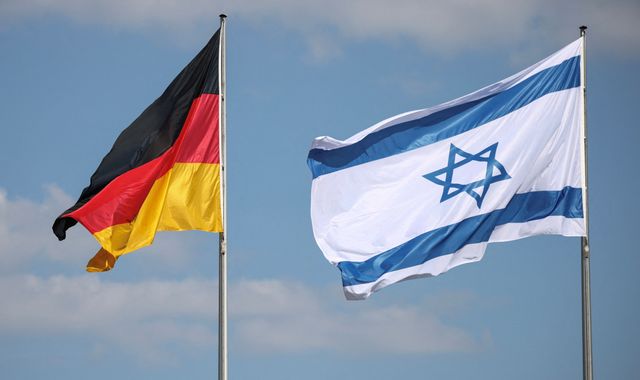Germany has often avoided the harsh criticism and tougher tones against Israel‘s government taken by some of its European allies.
Gaza escalation ‘wrong’ says Starmer; follow latest
Friday’s statement stands out and will isolate Israel further following the announcement of its controversial military takeover plan.
Chancellor Friedrich Merz was clear that Israel has a right to defend itself against Hamas, the hostages must be released, there must be negotiations towards a ceasefire, and Hamas does not have a role in Gaza’s future.
These messages are not new; this has been the government line since October 2023, but the stopping of some exports of military equipment shows the Germans believe Israel has crossed a line.
“In the view of the German government, the even tougher military action taken by the Israeli army in the Gaza Strip, which was decided last night by the Israeli cabinet, makes it increasingly difficult to see how these goals are to be achieved,” the chancellor said. “Under these circumstances, the German government will not authorise any exports of military equipment that could be used in the Gaza Strip until further notice.”
Following the announcement, several politicians showed their support, including vice chancellor, Lars Klingbeil, the leader of the Social Democratic Party (SPD), the junior member in Germany’s coalition government, who said: “This is the right decision.”
But others expressed their dismay online, including Johanne Winkel, the chairman of the Young Union, who wrote: “Israel is doing the dirty work for us starting today, just without German weapons.”
The German-Israeli society said in a statement: “If this decision by the German government remains in place, it will be a point victory for Hamas in the global propaganda war.”
After the United States, Germany is one of the main exporters of weapons to Israel.
In 2023, it approved arms exports worth 326.5 million euros (£283m), including military equipment and war weapons, according to reports by Reuters based on data from the economy ministry.
Last year, the approvals halved to 161 million euros (£140m), coinciding with a legal challenge by human rights groups concerned about the potential use of German weapons in the Gaza war.
Not a full weapons embargo – but morally significant
Following Friday’s announcement, I contacted the government to clarify exactly which weapons exports will be impacted.
I’m awaiting a reply but what’s clear is the move stops short of a full weapons embargo.
Gustav Gressel, a military analyst from the National Defence Academy of the Austrian Armed forces, says: “Morally, it’s a huge shift for Germany but practically it’s not that relevant.”
According to his industry sources, the majority of deals this year have been related to the navy and include items such as submarines, which would not be used in the Gaza Strip.
But that doesn’t mean this move isn’t important.
“It’s a huge shift. There’s still quite a lot of sympathy for Israel. The German environment is much more pro-Israel than the UK so symbolically, it’s quite dramatic,” Dr Gressel said.
Germany, due to its Nazi past and historic responsibility for the Holocaust, has long had a “special relationship” with Israel and has been one of its staunchest supporters over the years.
The country also has a policy of not sending weapons to active conflict zones but had given Israel an exception on the grounds of national defence.
Read more from Sky News
Analysis: Risk of a conflict with no near endpoint
Aid sites in Gaza are scenes of orchestrated killing
Why the IDF should let journalists into Gaza
In the months following the 7 October attacks, as some of Germany’s allies became increasingly critical of the actions of Benjamin Netanyahu, Berlin did not waver.
But recently, I have noticed a change in tone, a shifting in the government’s position.
In an interview at the end of May, the foreign minister announced a review of arms exports to Israel in light of possible violations of international humanitarian law in Gaza.
“We are examining whether what is happening in the Gaza Strip is compatible with international humanitarian law,” Johann Wadephul said in an interview with Suddeutsche Zeitung. “Further arms deliveries will be authorised based on the outcome of that review.”
There have also been growing calls to halt arms exports by senior members of the SPD.
Then, at the beginning of this month, during a visit to Jerusalem, the foreign minister warned Israel was in danger of becoming internationally isolated.
“I see it as Germany’s duty to do everything it can to prevent this,” he said, referring to Germany’s “never-ending historical obligation” for Israel’s security.
The government did not join announcements by the French president and UK prime minister to formally recognise a Palestinian state in September but said the process of recognition “must begin now”.
Public perception also appears to be changing.
In July, more than 200 prominent German celebrities and journalists urged the chancellor to stop arms deliveries and impose sanctions on Israel.
In an open letter, the group pointed to the suffering of children in Gaza and stressed: “We, too, condemn the horrific crimes of Hamas in the strongest possible terms. But no crime legitimises the collective punishment of millions of innocent people in the most brutal way.”
Meanwhile, a poll this week suggested the majority of Germans (66%) believe their country should put more pressure on Israel to address the devastating humanitarian situation unfolding in the Gaza Strip.
The survey by public broadcaster ARD also found the fate of the hostages still in captivity was the main concern for 72% of people polled.
So, while it’s currently unclear which arms exports Friday’s announcement will impact, the statement is hugely significant and marks a major change in policy for Germany.






























